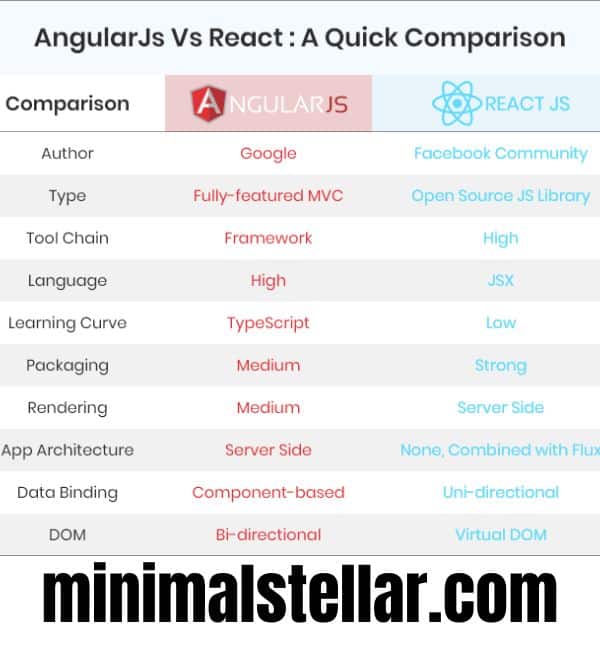In the fast-evolving world of web development, choosing the right framework can significantly impact project outcomes Angular vs React. This question dominates discussions as both frameworks continue to prove their worth. Angular, developed by Google, offers a robust, TypeScript-based structure, while React, backed by Meta, shines with its component-based architecture and flexibility.
As businesses aim to deliver high-performing and scalable applications, understanding the strengths of Angular and React becomes essential. Each framework caters to specific development needs, making the choice dependent on factors like project complexity, team expertise, and long-term goals. This comparison provides valuable insights to guide your decision-making process.
All About Angular
Angular, developed and maintained by Google, is a robust front-end framework known for building single-page applications (SPAs). Written in TypeScript, Angular provides a structured framework for creating scalable and maintainable applications. Its Model-View-Controller (MVC) architecture ensures clear separation between business logic and user interface, making it easier to manage complex projects.
One of Angular’s standout features is its two-way data binding, which allows seamless synchronization between the model and view. This ensures that any changes in the UI reflect instantly in the underlying data model and vice versa. Additionally, Angular’s dependency injection mechanism simplifies testing and debugging, contributing to faster and more reliable development cycles.
Why Use Angular?

Angular is favored for its comprehensive ecosystem and built-in tools that reduce the need for third-party libraries. The Angular Command Line Interface (CLI) enhances productivity by automating repetitive tasks, such as creating components and setting up testing environments. Angular’s built-in support for TypeScript enables developers to write clean and error-free code, ensuring better maintainability and scalability.
Another advantage is Angular’s compatibility with various devices, which makes it an ideal choice for responsive web applications. Its strong community support, backed by Google, ensures consistent updates and improvements, keeping the framework relevant in a competitive market.
All About React
React, developed by Meta (formerly Facebook), is a JavaScript library primarily used for building dynamic user interfaces. Unlike Angular’s full-fledged framework approach, React focuses on the View component of the MVC model, offering greater flexibility. React is renowned for its virtual DOM, which optimizes rendering and enhances performance by updating only the necessary components.
React’s component-based architecture promotes reusability, allowing developers to build applications faster and more efficiently. The use of JSX (JavaScript XML) makes React’s syntax easy to understand and enables seamless integration of HTML with JavaScript.
Why Use React?
React’s simplicity and flexibility make it a favorite among developers, especially for building dynamic and interactive web applications. Its vast ecosystem includes numerous third-party libraries and tools that extend its functionality. React’s focus on unidirectional data flow simplifies state management and improves debugging capabilities.
React’s SEO-friendly nature and support for server-side rendering (SSR) make it a preferred choice for developing high-performance applications. Additionally, its compatibility with other frameworks and libraries allows developers to create custom solutions tailored to specific project requirements.
Angular vs React: Key Comparisons

Popularity
React enjoys greater popularity compared to Angular, as evident from developer surveys and GitHub statistics. As of 2022, React is used by 42.62% of developers worldwide, whereas Angular has a 20.39% usage share. React’s lightweight nature and flexibility contribute to its widespread adoption, especially among startups and small businesses. On the other hand, Angular’s structured approach makes it a popular choice for enterprise-level applications.
Architecture and Data Binding
Angular follows the MVC architecture, which separates the application into three interconnected components—Model, View, and Controller. Its two-way data binding feature simplifies synchronization but may affect performance in large applications. React’s unidirectional data flow ensures better control over data, making it easier to debug and maintain. The use of a virtual DOM in React enhances rendering efficiency, providing a significant performance boost.
Goth Mens Fashion Essentials Style Guide
Dependency Injection
Angular’s built-in dependency injection system facilitates better code management, testing, and reusability. In contrast, React does not have an official dependency injection mechanism but relies on third-party libraries or JSX for similar functionalities. This difference highlights Angular’s focus on providing an all-in-one solution, while React emphasizes flexibility and customization.
Learning Curve
Angular has a steep learning curve due to its extensive documentation and reliance on TypeScript. Developers need to understand complex concepts like modules, decorators, and dependency injection. Conversely, React is easier to learn, especially for those familiar with JavaScript. Basic knowledge of JSX and component-based architecture is sufficient to get started with React.
Why Events Are Essential to the Hospitality Industry
Benefits of Using Angular Over React
- Angular’s integrated tools and libraries reduce dependency on third-party solutions, ensuring a streamlined development process.
- Its two-way data binding and MVC architecture make it ideal for large-scale applications requiring complex functionality.
- The strong backing of Google ensures regular updates and a vibrant community for support.
- Angular’s compatibility with TypeScript ensures clean and error-free code, enhancing maintainability.
Benefits of Using React Over Angular
- React’s virtual DOM improves rendering speed, making it suitable for dynamic and interactive applications.
- Its component-based architecture allows developers to reuse code, saving time and effort.
- The flexibility of integrating React with other frameworks and libraries enables tailored solutions.
- React’s SEO-friendly features make it ideal for building high-performance web applications.
Conclusion
Choosing between angular vs react depends on the specific requirements of your project. Angular’s comprehensive framework and structured approach make it a strong contender for enterprise-level applications, while React’s simplicity and performance optimizations cater to dynamic and interactive web apps. The key is to evaluate your project’s needs, team expertise, and long-term goals.
Both Angular and React continue to evolve, with regular updates ensuring their relevance in the web development landscape. By carefully considering the strengths and limitations of each framework, businesses can make informed decisions that align with their objectives and deliver optimal results.
What is dystopian fashion?
FAQs
What are the benefits of developing apps with Angular?
Angular simplifies code management, ensures compatibility with various devices, and provides seamless updates through its CLI. Its strong community support enhances reliability.
What are the benefits of developing apps with React?
React enables the development of fast, high-performing applications. Its component-based architecture and SEO-friendly features make it a popular choice for modern web development.
What is the key difference between angular-vs-react?
Angular is a full-fledged framework based on MVC architecture, while React is a JavaScript library focused on building UI components using a virtual DOM.
Is Angular better than React?
Angular excels in managing large-scale projects with complex requirements, while React outperforms in dynamic and interactive applications due to its flexibility and performance optimizations.
Which framework should I choose for my project?
The choice depends on your project’s specific needs. Angular is ideal for enterprise applications, while React is better suited for dynamic, user-centric web apps.

Eliana Amelia is the insightful author behind Minimal Stellar. With extensive experience in blogging, she expertly crafts content on the latest hair trends and cutting techniques. Eliana’s passion for haircare and style, combined with her professional expertise, ensures that her readers receive valuable, up-to-date advice. Her dedication to helping others look and feel their best shines through in every post.







